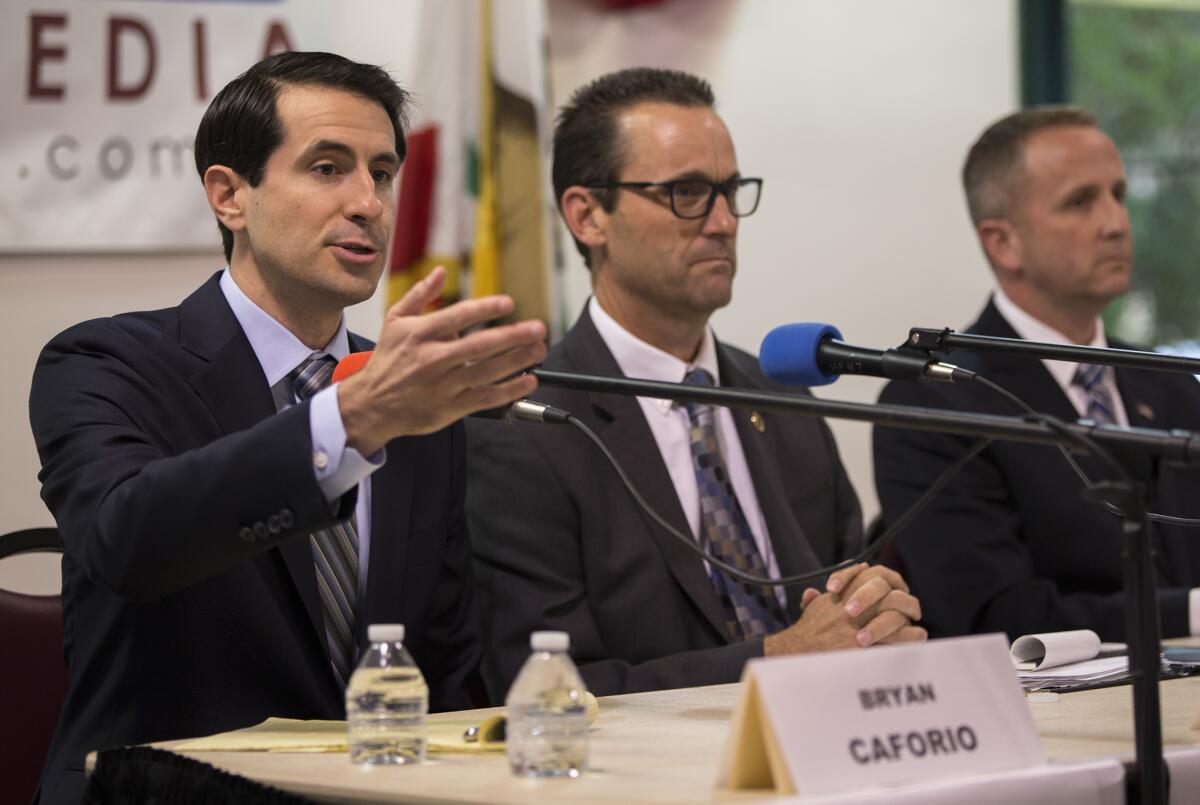This Democrat’s legal past both helps and haunts him in California’s most competitive congressional race

- Share via
When first-time candidate Bryan Caforio explains how he got into politics, he points out that it was his experience as a lawyer that fueled his decision last winter to jump into a heated Los Angeles County congressional race.
Caforio, 33, whom Democrats have identified as their best chance to oust one of the state’s Republicans, says that as a trial lawyer he “saw a system in which far too many people in our community were taken advantage of on an almost daily basis” because “corporate politicians” were “looking out for the biggest banks and the wealthiest corporations instead of the people back here at home.”
The comments came in a recently released campaign video called “My Story” that shows Caforio talking to a worker in a welding mask. The candidate then explains how his wife, Lisa, told him that “instead of doing this one case at a time, instead of doing it one client at a time,” he ought to run for Congress to “build a better system” and “an economy that works for everyone and not just the wealthy few.”
But an examination of Caforio’s six-year tenure at the Century City firm Susman Godfrey suggests his work more often involved being called upon by large corporations and multimillionaires from around the globe in times of legal need.
Caforio represented former Los Angeles Dodgers owner Frank McCourt during his contentious divorce proceedings in 2015. He was part of a legal team that defended Union Oil Co. of California in 2013 and 2014 when a group of 46 Montana residents accused the oil company of contaminating their property by letting petroleum seep from nearby storage tanks.
He also helped Skardon Baker, an executive with a downtown L.A. investment firm, defeat an architect who claimed he had been bilked out of $22,500 owed to him for designing a backyard cabana for the financier’s Hancock Park home.
Caforio’s defense of Union Oil in particular cuts against a main tenet of his campaign so far: aggressively attacking incumbent Rep. Steve Knight (R-Palmdale) for his slow response to the Aliso Canyon gas leak last winter.
In a fundraising email sent by Caforio’s campaign last month highlighting his endorsement by the League of Conservation Voters Action Fund, Caforio criticized Knight as being “bought and paid for by the oil and gas lobby” while describing himself as a “conservation voter my whole voting life.”
Caforio said in an interview he was only on the Union Oil case a few months and that his endorsements from the Sierra Club and the League of Conservation Voters point to his strong environmental stance.
He also said he has not and will not accept campaign contributions from gas or oil companies, pointing out that Knight has accepted $14,000 from Sempra Energy, the company responsible for the Aliso Canyon leak, during his runs for the state Legislature and Congress.
“I recognize climate science,” he said. “I recognize the key role we need to play protecting our planet, our community from climate change.”
The original Union Oil complaint, filed in 2013 by residents of Cut Bank, Mont., about 25 miles south of the Canadian border, accused the firm and four other companies of failing to warn residents that petroleum had “spread across, and seeped into and under their homes.” At least one resident complained of oil seeping up into her crawl space, according to Jonathan Cok, an attorney for the residents.
The suit was eventually settled when the companies agreed to put $13 million into a fund to clean up the area under a plan approved by the state environmental department. Some residents were given confidential settlements as well, Cok said.
Cok said he did not remember Caforio among the sea of lawyers who represented the oil companies during the proceedings in Montana. He recalled one pre-trial conference where he counted at least 60 attorneys present.
Updates on California politics »
National Democrats are betting on Caforio to flip California’s 25th Congressional District, a traditionally Republican bastion that stretches from Lancaster west through Santa Clarita into Simi Valley.
The nonpartisan Cook Political Report called Knight “the most vulnerable incumbent in California” this summer after the number of registered Democrats surpassed Republicans in the district. Democrats now have a 4,564-voter advantage among registered voters — a single-percentage-point lead — while about a fifth of voters in the district have no party preference, according to the latest figures from the California Secretary of State.
That demographic shift along with the potential harm presidential nominee Donald Trump could have on down-ballot Republicans has made national Democrats giddy at the thought of ousting Knight. Caforio has attacked Knight’s waffling on Trump as well as Knight’s firm opposition to abortion.
Caforio angered some local Democratic party activists when he entered the race last December. He and his wife had only recently moved from Los Angeles into the suburban district. Still, Caforio outraised and defeated the other Democrat in the race, LAPD Lt. Lou Vince, who was hampered by poor fundraising as well as by revelations he was once accused of assaulting a black motorist.
Since the launch of his campaign, Caforio has emphasized his legal career. He calls himself a consumer rights attorney in campaign material. When he spoke to The Times last fall he said he had a “history of taking on the toughest fights,” including suing Swiss bank UBS on behalf of an investor.
In that case, the investor wasn’t exactly an average Joe. Caforio represented Egyptian activist investor Ahmed Hussein, who accused UBS of disrupting a proxy fight he was waging with the board of a healthcare company, according to federal court records.
Caforio and another attorney from his firm won Hussein a $2-million award from the Financial Industry Regulatory Authority. Hussein — using the same team of lawyers — later sued UBS for more than $55 million in damages. UBS pegged Hussein’s net worth at $400 million in 2012, according to the Wall Street Journal.
Though Hussein was a wealthy client, Caforio said it doesn’t change the fact that he suffered losses. Caforio boasted of his own work that he “was still going up against one of the largest banks in the world.”
The case was one of five listed on Susman Godfrey’s online biography for Caforio under the heading “notable representations.” That page was deleted sometime between April and August of this year but an online cache remains available.
Caforio started working at the boutique law firm in 2009 after he graduated from Yale Law School and clerked for Judge Sidney R. Thomas of the U.S. 9th Circuit Court of Appeals.
Caforio, a partner in the firm whose motto is “High Stakes. High Performance,” earned $517,629 working at the firm last year, according to a financial disclosure form he filed with the House of Representatives as a candidate for office. He has withdrawn from his partnership as he campaigns for Congress and is not currently drawing a salary, he said.
His former co-workers have been generous to his campaign — contributions from employees of the firm add up to $78,920, according to the latest filings with the Federal Election Commission.
Another “notable” case involved Caforio’s defense of the software company RealNetworks after another company sued it in 2012 for more than $30 million in a patent dispute. According to Susman’s webpage, the case was settled for a confidential amount.
Though it wasn’t among the cases his firm highlighted, Caforio told The Times that in 2010 he represented a court-appointed receiver who was tasked with recovering money for investors who federal prosecutors said were defrauded by former Sherman Oaks money manager Bruce Friedman in a $228-million investment scam.
He also represented the National Credit Union Administration when it took on RBS Securities Inc.
One of Caforio’s more peculiar “notable” cases didn’t involve big corporations or patents but rather a dispute over a backyard cabana.
The two-year case in Los Angeles County Superior Court in Santa Monica began in 2010 when Skardon Baker, then a managing director and equity partner from the downtown Los Angeles investment firm Oaktree Capital Management and former speechwriter for George W. Bush when he was Texas governor, was sued by an architect he had hired to design the cabana in 2006.
A judge ruled in Baker’s favor in 2012.
Times editorial library director Cary Schneider contributed to this report.
Twitter: jpanzar
ALSO
How a congressional race in Santa Barbara became one of the most expensive in the country
Rep. Steve Knight hit with attack ad in Los Angeles County congressional race
Race, oil and the environment all play into this L.A. congressional race
Updates on California politics
More to Read
Get the L.A. Times Politics newsletter
Deeply reported insights into legislation, politics and policy from Sacramento, Washington and beyond. In your inbox three times per week.
You may occasionally receive promotional content from the Los Angeles Times.











